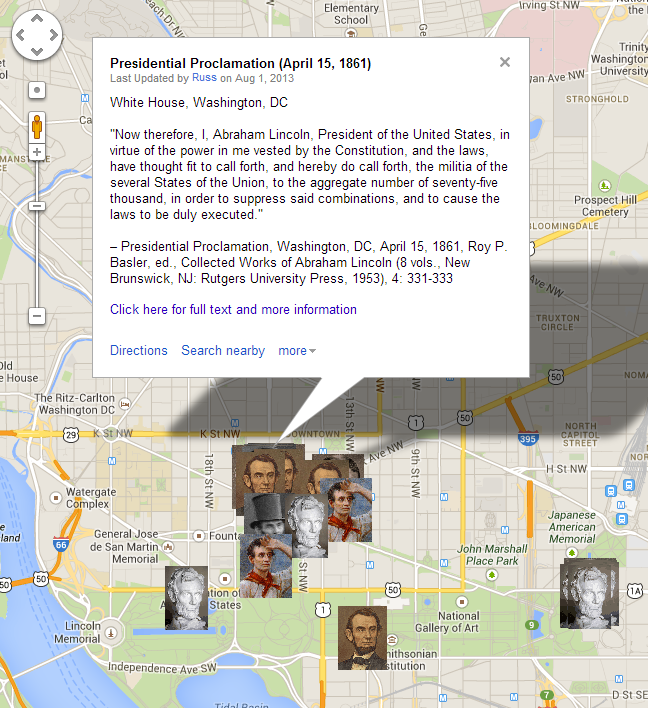Contributing Editors for this page include Daniel Caudle
Ranking
#41 on the list of 150 Most Teachable Lincoln Documents
Annotated Transcript
Audio Version
On This Date
HD Daily Report, April 15, 1861
The Lincoln Log, April 15, 1861
Close Readings
Posted at YouTube by Understanding Lincoln participant Daniel Caudle, 2016
Custom Map
How Historians Interpret
“The cabinet also considered how large a militia force to call up. Some favored 50,000; Seward and others recommended double that number. Lincoln split the difference and decided to ask the states to provide 75,000 men for three months’ service, which the Militia Act of 1795 authorized. Once that was determined, action was swift: the president drafted a proclamation, Cameron calculated the quotas for each state, Nicolay had the document copied, and Seward readied it to distribute to the press in time for Monday’s papers. That afternoon, Lincoln went for a carriage ride with his sons and Nicolay.”
–Michael Burlingame, Abraham Lincoln: A Life (2 volumes, originally published by Johns Hopkins University Press, 2008) Unedited Manuscript by Chapter, Lincoln Studies Center, Volume 2, Chapter 22 (PDF), 2420.
“Lincoln issued that proclamation under the Militia Act of 1795. The proclamation announced the purpose of executing the laws of the United States and securing the integrity of republican government. In accordance with the terms of the Militia Act, Lincoln stated that combinations too powerful to be suppressed by the ordinary course of judicial proceedings, or by the powers vested in the marshals by law, obstructed enforcement of the laws in the seven seceded states. In virtue of power vested in the executive by the Constitution and the laws, he called forth 75,000 state militia to suppress the unlawful combinations, commanding the persons who composed them to disperse and retire peaceably within twenty days. Lincoln further issued a statement of war aims addressed to the country as a whole. He declared: ‘I appeal to all loyal citizens to favor, facilitate and aid this effort to maintain the honor, the integrity, and the existence of our National Union, and the perpetuity of popular government; and to redress wrongs already long enough endured.’”
— Herman Belz, “Lincoln’s Construction of the Executive Power in the Secession Crisis,” Journal of the Abraham Lincoln Assocation 27, no. 1 (2006), 13-38.
NOTE TO READERS
This page is under construction and will be developed further by students in the new “Understanding Lincoln” online course sponsored by the House Divided Project at Dickinson College and the Gilder Lehrman Institute of American History. To find out more about the course and to see some of our videotaped class sessions, including virtual field trips to Ford’s Theatre and Gettysburg, please visit our Livestream page at http://new.livestream.com/gilderlehrman/lincoln
Searchable Text
A Proclamation by the President of the United States.
Whereas, the laws of the United States have been for some time past and now are opposed, and the execution thereof obstructed, in the States of South Carolina, Georgia, Alabama, Florida, Mississippi, Louisiana, and Texas, by combinations too powerful to be suppressed by the ordinary course of judicial proceedings, or by the powers vested in the marshals by law: now, therefore, I, Abraham Lincoln, President of the United States, in virtue of the power in me vested by the Constitution and the laws, have thought fit to call forth, and hereby do call forth, tho militia of the several States of the Union to the aggregate number of 75,000, in order to suppress said combinations and to cause the laws to be duly executed.
The details for this object will be immediately communicated to the State authorities through the War Department. I appeal to all loyal citizens to favor, facilitate, and aid this effort to maintain the honor, the integrity, and existence of our national Union, and the perpetuity of popular government, and to redress wrongs already long enough endured. I deem it proper to say that the first service assigned to the forces hereby called forth, will probably be to repossess the forts, places, and property which have been seized from the Union; and in every event the utmost care will be observed, consistently with tho objects aforesaid, to avoid any devastation, any destruction of, or interference with, property, or any disturbance of peaceful citizens of any part of the country; and I hereby command the persons composing the combinations aforesaid, to disperse and retire peaceably to their respective abodes, within twenty days from this date.
Deeming that the present condition of public affairs presents an extraordinary occasion, I do hereby, in virtue of the power in me vested by the Constitution, convene both houses of Congress. The Senators and Representatives are, therefore, summoned to assemble at their respective Chambers at twelve o’clock, noon, on Thursday, the fourth day of July next, then and there to consider and determine such measures as, in their wisdom, the public safety and interest may seem to demand.
In witness whereof, I have hereunto set my hand, and caused the seal of the United States to be affixed.
Done at the City of Washington, this fifteenth day of April, in the year of our Lord, one thousand eight hundred and sixty-one, and of the independence of tho United States the eighty-fifth.
ABRAHAM LINCOLN.
By the President.
William H. Seward, Secretary of State.

